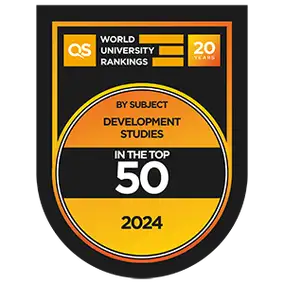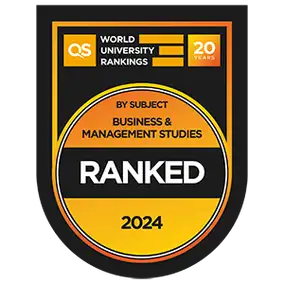Where you can study
International students
International students are not New Zealand citizens or residents.
Specialise in Economics for Sustainability for your Master of Sustainable Development Goals at Massey
The Master of Sustainable Development Goals (Economics for Sustainability) focuses on the theory and practice of the United Nations Sustainable Development Goals (SDGs). This programme addresses the most pressing imperative facing humanity and the planet: sustainability.
What are the Sustainable Development Goals?
The SDGs are the UN’s ambitious macro-level plan for humankind’s development and sustainability. The goals address global challenges including those related to poverty and inequality, climate and environmental degradation, prosperity, peace and justice.
Follow your interests
All students take two core courses in sustainable development. The first will introduce you to the theories of sustainable development and the SDGs. The second course focuses on multi-disciplinary frameworks. The courses will also focus on how to measure progress against the SDGs, as well as alternative and indigenous paradigms, knowledge and practice in the field of sustainability.
Economics plays an essential role in the understanding and analysis of the allocation of scarce resources and provides a framework for thinking about how economic activity and technology are inextricably linked with social and environmental development. From a practical perspective, economic analysis today dominates policy discourse in both government and private sectors. This is an interdisciplinary subject that welcomes students with both economic and non-economic backgrounds.
Real-world research
The final 60-credit component of your degree is a research practicum. You’ll identify an organisation or agency with which to work towards policies or practices guided by the SDG framework for peace and security. You’ll then conduct research on, and analyse the peace and security work undertaken by that organisation.
A Master of Sustainable Development Goals in Economics for Sustainability is a good fit if you:
- Want to understand alternative economics within the context of sustainability and wellbeing
- Are looking to improve your skills in applying sustainability principles and practices
- Are interested in working within sustainable, inclusive economics
Planning information
The Master of Sustainable Development Goals (Economics for Sustainability) is a parts-based qualification. That means you must complete the first part, before moving to the second.
Part One is coursework and Part Two is a research practicum.
For progression from Part One to Part Two, you must achieve a Grade Average of at least a B over the 120 credits of the Part One courses.
If you study full-time, you’ll take 120 credits per year or 60 credits per semester.
Official regulations
To understand what you need to study and must complete to graduate read the official rules and regulations for this qualification.
You should read these together with all other relevant Statutes and Regulations of the University including the General Regulations for Postgraduate Degrees, Postgraduate Diplomas, and Postgraduate Certificates.
Returning students
For returning students, there may be changes to the majors and minors available and the courses you need to take. Go to the section called ‘Transitional Provisions’ in the Regulations to find out more.
In some cases the qualification or specialisation you enrolled in may no longer be taking new enrolments, so may not appear on these web pages. To find information on the regulations for these qualifications go to the Massey University Calendar.
Please contact us through the Get advice button on this page if you have any questions.
Courses you can enrol in
Course planning key
- Prerequisites
- Courses that need to be completed before moving onto a course at the next level. For example, a lot of 200-level courses have 100-level prerequisite courses.
- Corequisites
- Courses that must be completed at the same time as another course are known as corequisite courses.
- Restrictions
- Some courses are restricted against each other because their content is similar. This means you can only choose one of the offered courses to study and credit to your qualification.
Core courses for the Master of Sustainable Development Goals
As well as the specialisation courses listed below, this qualification has core courses that you will need to complete.
Master of Sustainable Development Goals core courses
Economics for Sustainability courses
Part One Subject courses
Course code: 178719 Climate Change Economics and Policy 30 credits
An analysis of the economics of climate change and evaluation of the mitigation options used by policy makers globally.
View full course detailsCourse code: 178740 Global Food Markets and Trade 15 credits
An economic analysis of the global food markets with emphasis on international trade, agri-food policies, and on the industrial organisation of the contemporary food sector.
View full course detailsCourse code: 178742 Environmental Economic Issues 15 credits
Economic analysis of policy management issues in the use of natural resources, climate change, and the environment.
View full course detailsCourse code: 178755 Economic Growth, International and Development Economics 30 credits
A critical assessment of topics from economic growth, international economics and the nature and measurement of development. There is an emphasis on the empirical and policy implications of development strategies including the relationship between managing development, role of the State, international economy, globalisation, trade theory and policy, global crises, and macroeconomic policy.
View full course detailsPart Two
Course code: 131810 Sustainable Development Goals Practicum 60 credits
Advanced study in the application of the Sustainable Development Goals, involving 320 hours of professional work in an approved agency. As an integral part of the course, students will critically analyse how this work can be understood in relation to current literature on the SDGs and sustainable development.
View full course detailsEntry requirements
Admission to Massey
All students must meet university entrance requirements to be admitted to the University.
Specific requirements
To enter the Master of Sustainable Development Goals (Economics for Sustainability) you will have been awarded or qualified for a bachelor’s degree (or equivalent) with a grade average of at least B in the highest level courses.
You will need to provide copies of all official academic transcripts for studies taken at all universities other than Massey University.
English language requirements
To study this qualification you must meet Massey University's English language standards.
English language skills
If you need help with your English language skills before you start university, see our English for Academic Purposes (EAP) courses.
Fees and scholarships
Fees, student loans and free fees scheme
Your tuition fees may be different depending on the courses you choose. Your exact fees will show once you have chosen your courses.
There will also be some compulsory non-tuition fees and for some courses, there may also be charges for things such as study resources, software, trips and contact workshops.
- Get an estimate of the tuition fees for your qualification
- View a list of non-tuition fees that may be payable
Already know which courses you're going to choose?
You can view fees for the courses that make up your qualification on the course details pages.
Student loans (StudyLink) and Fees Free scheme
You may be eligible for a student loan to help towards paying your fees.
The New Zealand Government offers fees-free tertiary study for eligible domestic students. Find out more about the scheme and your eligibility on the Fees Free website. To use the site's eligibility checking tool, you will need your National Student Number.
Current and returning Massey students can find their National Student Number in the student portal.
- Student loans (StudyLink)
- Fees Free
- Student portal
Scholarship and award opportunities
Search our scholarships and awardsFees disclaimer
This information is for estimation purposes only. Actual fees payable will be finalised on confirmation of enrolment. Unless otherwise stated, all fees shown are quoted in New Zealand dollars and include Goods and Services Tax, if any. Before relying on any information on these pages you should also read the University's Disclaimer Notice.
Careers and job opportunities
There is a strong demand in the global marketplace for workers with the skills to translate, implement, monitor and report on the SDGs. Specifically, the increasing recognition of the challenges faced by current economics has created a vast need for graduates with the skills and knowledge associated with sustainability or ecologically oriented economics.
Employers are increasingly recognising the importance of employees who possess analytical skills and the ability to translate conceptual and normative underpinnings on SDG into concrete and empirically-supported policy recommendations within fields such as:
- Climate finance
- Wellbeing economics
- Ecological economics
- Treasury and the public sector
- Private economic institutions
International students
New Zealand is a great place to study. Massey University’s reputation is supported by our international rankings, accreditations and associations. We are rated 5-star plus by the QS World University Rankings.
Massey University has small class sizes, and our lecturers and staff are friendly and approachable.
As an international student, there are entry requirements that will apply to you. We recommend that you apply at least three months before your anticipated start date so your application can be processed in time. There are additional steps you will need to take. These include obtaining a visa and travel bookings if your study is to be in New Zealand.
Accreditations and rankings

QS Ranking - Development Studies
Massey is ranked 30th in the world for development studies in the Quacquarelli Symonds (QS) World University Rankings.
Related study options
Diploma in Facilities Management – DipFM
Learn about operational maintenance and management of built facilities with Massey's Diploma in Facilities Management. This will open the way to a diverse and challenging career.
Economics – Bachelor of Business
The Bachelor of Business (Economics) is a versatile degree where you will learn how the world of business works, and gain the skills to interpret global information and events.
Economics – Bachelor of Arts (Honours)
With Massey’s Bachelor of Arts (Honours) (Economics) you can take your undergraduate study of economics further.
Economics – Master of Business Studies
Massey’s Master of Business Studies (Economics) will give you the business and economics skills to take your career to the next level. Specialising in economics will give you many career options.
Economics – Bachelor of Arts
Succeed as a professional in the private, not-for-profit or public sector. Learn how the economy affects our everyday life, culture, and environment.
Economics – Diploma in Arts
Improve your economic decision-making skills and understanding with Massey’s Diploma in Arts (Economics).
Economics – Postgraduate Diploma in Arts
With Massey's Postgraduate Diploma in Arts (Economics) you’ll build on your undergraduate interests and further investigate topics in economics that have taken your interest.
Economics – Master of Arts
Open up a world of employment options. With Massey’s Master of Arts (Economics) you’ll build on your undergraduate interests and develop your analysis and research skills.
Economics – Graduate Diploma in Arts
The Graduate Diploma in Arts (Economics) will give you the equivalent of an undergraduate major in economics without having to complete a second bachelor’s degree.
Financial Economics – Master of Management
The Master of Management will increase your business knowledge to help move your career in a new direction. You don’t have to have a qualification in business to undertake this master’s.
Graduate Diploma in Facilities Management – GradDipFM
Build on your existing knowledge and skills in construction with Massey’s Graduate Diploma in Facilities Management. Learn how to organise, control and coordinate the strategic and operational management of facilities.
Useful planning information

Key information for students
Compare qualifications and academic information across different New Zealand institutions. Learn more on careers.govt.nz
